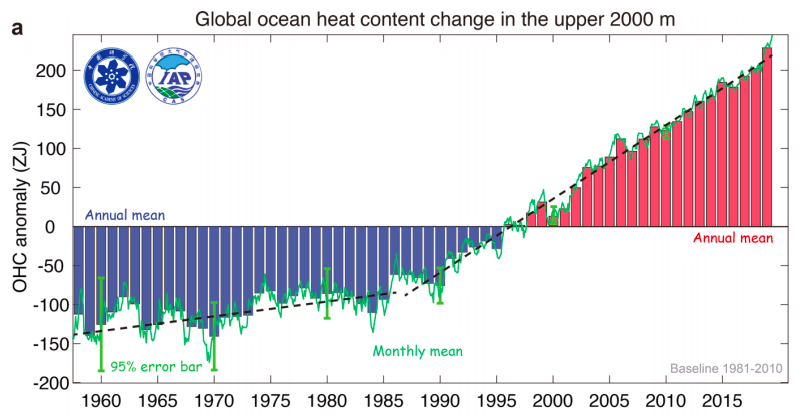2019 – Record Setting – In All the Wrong Ways
Study Reveals the Fifth Consecutive Annual Rise in Ocean Temperatures
Last year was the warmest year on record for the world’s oceans – just as the previous four years have all been record-breakers.
A study published in the journal Advances in Atmospheric Sciences this week confirms the disturbing trend. The oceans have absorbed more than 90 per cent of the excess heat caused by human-induced climate change and are rapidly warming.

‘The oceans are really what tells you how fast the Earth is warming,’ said Prof John Abraham at the University of St Thomas, in Minnesota, US, and one of the team behind the new analysis. ‘Using the oceans, we see a continued, uninterrupted and accelerating warming rate of planet Earth. This is dire news.’
‘We found that 2019 was not only the warmest year on record, it displayed the largest single-year increase of the entire decade, a sobering reminder that human-caused heating of our planet continues unabated,’ said Prof Michael Mann, at Penn State University, US, and another team member.
‘If you look at the ocean heat content, 2019 is by far the hottest, 2018 is second, 2017 is third, 2015 is fourth, and then 2016 is fifth,’ said Kevin E Trenberth, a senior scientist at the National Center for Atmospheric Research and an author on the study.
Measuring the ocean’s temperature is a challenge for scientists. Thermometers on land around the world have tracked temperatures for more than a century, but ocean temperatures are far harder to establish.

The main source for the study was the Argo global network of 3,000 drifting floats equipped with sensors that measure temperature and depth which has been running since 2007. Before that, researchers had to rely on an ad hoc system of ocean temperature measurements. Many of these were taken from the sides of ships and excluded Antarctic waters until the late 1950s.
For the latest study, the researchers overcame some of the gaps in the historical ocean temperature record by an understanding of how a temperature reading in one area relates to ocean temperatures across the ocean overall gleaned from data from the Argo system. The new method allowed them to take the limited temperature observations from the pre-Argo era and extrapolate them into a broader understanding of past ocean temperature.
‘What we find is that we can do a global reconstruction back to 1958,’ Trenberth said. That year was when systematic temperature observations began in Antarctica, creating enough temperature points for the extrapolation to be feasible.
The past 10 years have been the warmest 10 on record for global ocean temperatures. The increase between 2018 and 2019 was the largest single-year increase since the early 2000s.
Hotter oceans have led to widespread coral bleaching plus more severe storms, floods, droughts and wildfires, as well as an inexorable rise in sea level.


